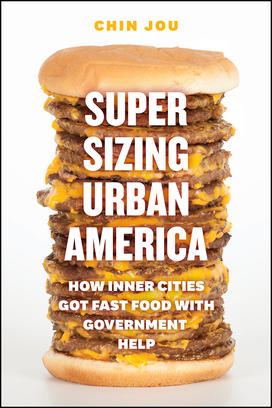Chin Jou *09 Examines America’s Supersized Obesity Epidemic

The book: Former Surgeon General Richard Carmona has called obesity “the terror within,” one that “will dwarf 9/11.” More than one-third of adults in the United States today are obese, and initiatives like Michelle Obama ’85’s “Let’s Move” are just the latest in the government’s very public war on the obesity epidemic. Hidden from the narrative of obesity in America until now, however, is the role the government has played in abetting obesity — particularly in the urban African-American communities, which have disproportionately high rates of obesity and high concentrations of fast-food restaurants. With Supersizing Urban America: How Inner Cities Got Fast Food with Government Help (University of Chicago Press), Chin Jou *09 offers an account of the history of federal policies that helped the proliferation of junk food — such as programs intended to promote minority entrepreneurship, loan guarantees to fast-food franchisees, and other urban revitalization efforts — which played out alongside unrelenting marketing campaigns by fast-food companies to low-income minority populations.
The author: Jou earned her Ph.D. in history from Princeton in 2009 and is now a lecturer in American history at the University of Sydney. Supersizing Urban America is her first book.
Opening lines: “‘For more than three decades the fast food industry has used the Small Business Administration (SBA) to finance new restaurants …’ The idea for this book began with this excerpt from Eric Schlosser ’81’s Fast Food Nation (2001). While re-reading the book in 2010, I was fixated on this one, brief, stunning section. The federal government helped underwrite the fast food industry? Really? Did Schlosser know more about the history of the SBA and the fast food industry? Could he direct me to more sources? Given that the SBA was incidental to Schlosser’s story, it was not surprising when he related that all he knew on the matter was what he had included in Fast Food Nation.”
Reviews: Marion Nestle, author of Soda Politics: Taking on Big Soda (and Winning), says, “This page-turner of a book tells a virtually unknown story. … For anyone interested in the role of government policy in food, health, and race relations, Supersizing Urban America is a must-read.”












No responses yet